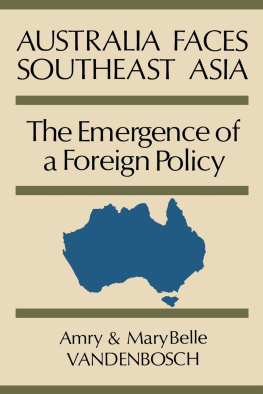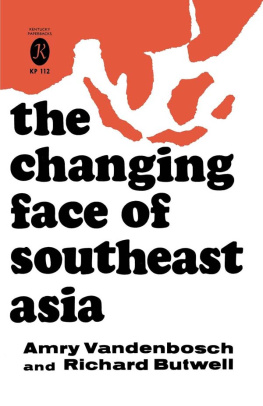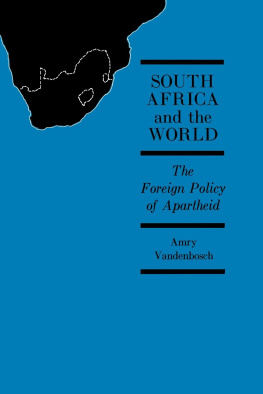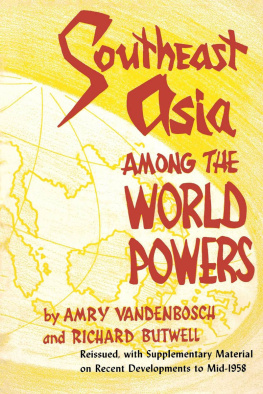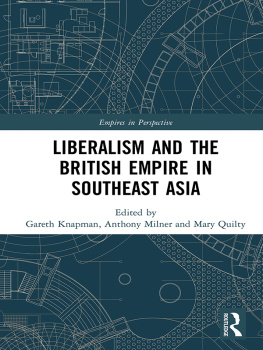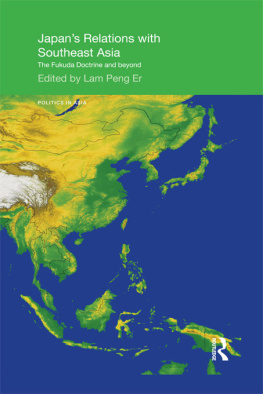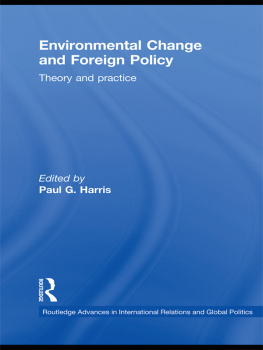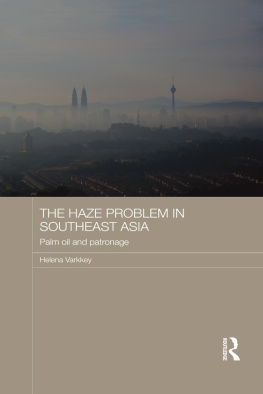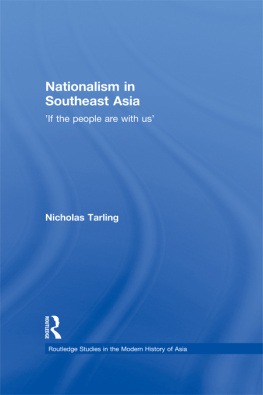PREFACE
For several centuries before World War II, Southeast Asia had been a calm backwater in world politics. With the Japanese occupation of Indochina in 1940 the attention of the world suddenly was drawn to the region. After the sweeping invasion by the Japanese after Pearl Harbor, and especially after the fall of Singapore in February, 1942, Southeast Asia became one of the most critical areas of the war. Japans surrender did not bring peace and calm to the region, as colonial wars and Communist guerrilla activities followed the Japanese capitulation. Except for a few fragments of the Portuguese empire, western colonialism has disappeared from the region, except for East New Guinea, which is administered by Australia. The life of the new states has been turbulent, and they have experienced disorders, insurgency, and military takeovers. Nor has the region enjoyed international peace; there has been bitter and protracted conflict between great powers in this strategic corner of the world, as well as confrontations which came near to an outbreak of war.
No country was more affected by these changes and developments than Australia, a country settled primarily by westerners and situated on the edge of the explosive region. The changed situation profoundly influenced Australian national life. With the fall of Singapore, Australia suddenly had to readjust its foreign policy which psychologically was not easy. The pressure of current events forced it to move further in new directions. Developments in Southeast Asia are important for world peace; for Australia they may involve national survival, making its policy toward the region greatly important. Because of the close relations which have developed between the United States and Australia and the United States deep involvement in the region, Australian policy toward Southeast Asia should be of keen interest to Americans.
In this study we have quoted extensively from speeches in Australias Parliament, official documents, and newspapers to give the reader the Australian point of view.
We incurred numerous debts of gratitude in making this study. The Commonwealth Institute of the University of London generously put its facilities at our disposal, and its staff members were very helpful. Sir Alan Watt and his staff at the Australian Institute of International Studies at Canberra extended us every courtesy. To these and others too numerous to mention we are deeply grateful.
| May, 1967 | AMRY VANDENBOSCH |
| MARY BELLE VANDENBOSCH |
Postwar Reappraisal of External Policy
Situated as we are in the South-West corner of the Pacific, with the outlying islands of the Asian continent almost touching our own territories of New Guinea and Papua, our first and constant interest must be the security of our own home-land and the maintenance of peace in the area in which our country is geographically placed. We could many years ago reasonably regard ourselves as isolated from the main threats to our national security. and our traditional British Commonwealth and United States of issue because changes since the war have resulted in a shifting of potential aggression from the European to the Asian area, and our traditional British Commonwealth and United States of America friends have not yet completed their adjustments to the new situation. A very great burden of responsibility rests especially on us, but also upon the other British Commonwealth countries of this area.

It is indisputably true,... that peace is indivisible and that what takes place in any part of the world concerns us. But it should at all times be stressed that here in this part of the world we are faced with special problems, and it is to a solution of these problems that our attention should primarily be directed.
P. C. SPENDER
Minister for External Affairs
March 9, 1950.
THE SECOND WORLD WAR brought profound changes in Australias relations with the world, and Australians have found agonizing their experience in reappraising their position and developing a foreign policy to meet unprecedented challenges. Australias changed situation resulted chiefly from two developments. First, the neighboring region of Southeast Asia, which for several centuries had been a calm, inconspicuous region of the world, suddenly was drawn into the vortex of international politics by the Japanese invasion. Although Japan was ultimately defeated, a new threat to Southeast Asia and Australia emerged on the mainland of East Asia. Nor was the expulsion of Japan from the region followed by peace and quiet, but by strife. Minister for External Affairs Richard G. Casey summarized the new perils succinctly: Instead of living in a tranquil corner of the globe we are now on the verge of the most unsettled region of the world.
This change in conditions in Southeast Asia was worsened by the realization that Britain, on whom Australia had relied for its security, had proved unable to aid her dominion when it was threatened with an invasion by the triumphant Japanese armed forces. Unfortunately, Britains military decline was not to be temporary. While recovering its former colonial territories, the United Kingdom soon adopted a policy of liquidating its imperial interests and reducing its military commitments, especially in that part of the world.
Australians were quite unprepared for the task of reorienting their foreign policy. In contrast with the thirteen English colonies in North America each of the Australian states remained a separate British colony until the proclamation of the commonwealth on January 1, 1901. Consequently, there developed no independent spirit, for Australia, as a Labor member of Parliament says, grew up under the physical and psychological wing of Great Britain. occupying a continent bounded by the vastness of the Indian and Pacific oceans. With such great resources to exploit they developed a high level of living, even by western standards. A strong trade union movement and vigorous Labor party politics insured the diffusion of prosperity. What caused Australians some anxiety was the thought either of foreign conquest, especially by an Asian power, or of large-scale Asian immigration. Since they were so few in numbers and so underdeveloped industrially, they could not possibly defend themselves against attack by a major power. Their living levels might be depressed and English culture submerged by the movement of numerous people from the populous and impoverished Asian countries to Australia.
Australias response to this double threat was the promotion of British (and later of western and southern European) immigration, the exclusion of orientals (the white Australia policy), and the maintenance of close ties with the British Empire. So long as Britain ruled the sea, Australians felt reasonably safe, but Japans rapid modernization and increasing world power concerned Australians and increased rather than diminished their reliance upon Britain. Other factors, such as the importance of the United Kingdom as a market for Australian products and Australias dependence upon British capital for development, reinforced this strong pro-British orientation. The United Kingdom, which takes about one-fifth of the Australian exports and supplies some-what less than one-third of its imports, is Australias most important trading partner.

